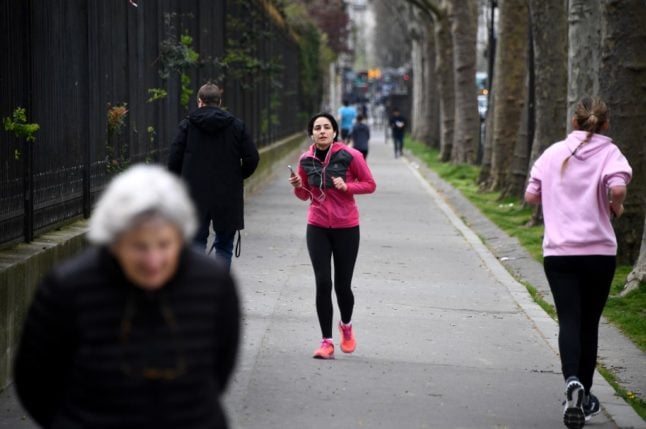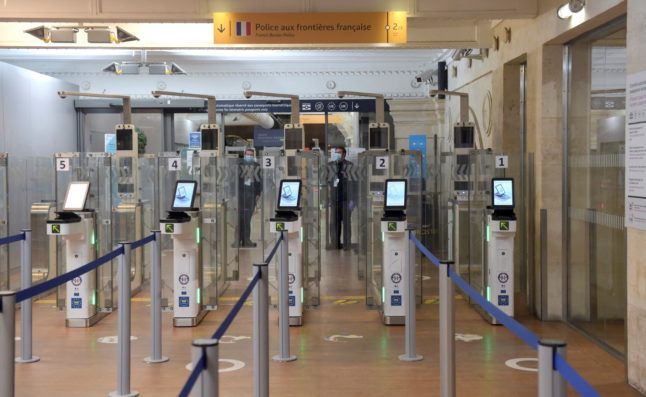Macron made the announcement in a live speech to the nation on Tuesday evening, where he also outlined three phases for lifting lockdown moving forward.
“We have passed the peak of the second wave,” Macron said, “our efforts, your efforts, have paid off.”
Up until November 28th France's rules on taking exercise were similar to those during the first lockdown, limited to one hour and 1 kilometre from the home, always in the company of a signed and dated attestation (permission form).
All sports clubs were closed.
November 28th
On this date, the government will relax some of the rules while other restrictions in place.
Three hours and 20 kilometres – Everyone will be able to go outside for a walk, exercise or play certain sports for up to three hours at the time and within a radius of 20 kilometres around their homes.
If in doubt about how far 20 kilometres is from your home, you can check out this handy little map from Le Parisien. Tap in your address and a circle appears showing how far you are allowed to distance yourself without breaking the rules.
Attestation – Everyone leaving their house must continue to, whatever their errand is, bring a signed permission form to show police in the event of a check. This rule will be in effect until December 15th, when France will lift lockdown if Covid-19 cases stay low. However the attestation will likely change, seeing as the current one specifies exercise as limited to 1 kilometre and one hour.
Individual – This will not change either. As has been the case since the second lockdown entered into effect, exercise should be done on an individual basis. That means going for a walk or a run and 'just happening' to bump into your friends does not fit within the rules. Social distanced walks with friends will not be allowed yet either.
Activity: Up until now the permitted activities have not been listed in the attestation but this has included individual outdoor activities such as jogging, cycling and walking (with or with a dog).
Sports – However some outdoor sports are once again permitted from Saturday. Tennis is allowed and golf clubs are permitted to reopen albeit with strict sanitary rules in place. Individual water sports such as surfing and wind surfing are allowed from Saturday.
Horse riding, fishing and athletics are also allowed.
Family – You can however walk or run with others if they live in the same household as you.
Group sports – Remain forbidden. The exception to the rule is children, as French Sports Minister Roxana Maracineanu said in the tweet below. Sport clubs for children may resume their activity as of November 28th if they are outdoors.
Le président @EmmanuelMacron a annoncé qu’à partir du 28 novembre, la pratique sportive sera possible dans la limite de 3H/jour, dans un rayon de 20km autour du domicile avec attestation.
Et la pratique sportive des mineurs dans le cadre associatif fera son retour en extérieur— Roxana Maracineanu (@RoxaMaracineanu) November 24, 2020
Driving to a forest – If you want to take your car to drive to a nicer place to work out, you likely will be able to – however this has not yet been specified. Prime Minister Jean Castex will hold a press conference on Thursday morning to provide more details on the new lockdown rules.
Dog-walking – This is covered by the exercise box and must respect the three hour, 20 kilometres-rule.
Parks/gardens – Unlike the first lockdown, parks and public gardens never closed this time and they will continue to stay open in the weeks ahead.
To work – Work trips and trips to pick up children after school are not covered by the exercise box on the attestation and therefore not subject to the same rules. This was perhaps a bit more important in the period preceding November 28th seeing as few parents will have to exceed the 20 kilometres-limit to get their children after school.
9pm – France is planning to install a national nighttime curfew on December 15th, but until that date there is nothing illegal about going for a nocturnal walk, as long as you have the attestation with you.
December 15th
This is the date France plans to lift lockdown, which means no more filling out attestations to go out the door, no more rules limiting how far you are allowed to distance yourself from the home, and – crucially – no more restricting exercise to individual practices.
That means football games outside, a match of tennis or a walk will friends will be lawful again.
All this depends on the fact that Covid-19 cases remain low enough for the government to ease the lockdown.
9pm-7am – A new nighttime curfew will make it illegal to go outside for exercise purposes between 9pm and 7am.
Swimming pools and gyms – Will remain closed.
January 20th
If numbers remain below 5,000 new Covid-19 cases per day, the limit Macron set on Tuesday evening, the government will lift the remaining rules on this date.
Gyms and pools – will reopen, if health conditions are met.



 Please whitelist us to continue reading.
Please whitelist us to continue reading.
Member comments